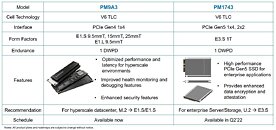Samsung has recently provided a few details of their PM1743 PCIe Gen 5 E3.S 1T EDSFF SSD set to release in Q2 2022. The PM1743 is an upcoming enterprise SSD from Samsung with PCIe 5.0 x4 connectivity which can enable a theoretical maximum speed of 15.7 GB/s. The SSD features V6 TLC NAND flash and comes with 1 Drive Writes Per Day (DWPD) of write endurance. The drive features an enterprise E3.S 1T single-width form factor (111.5 mm × 31.5 mm) popular in server deployments and will likely come with a TDP of 20-25 W. Samsung has provided a basic mechanical drawing of the SSD but we expect to find out more information closer to release.

View at TechPowerUp Main Site

View at TechPowerUp Main Site






